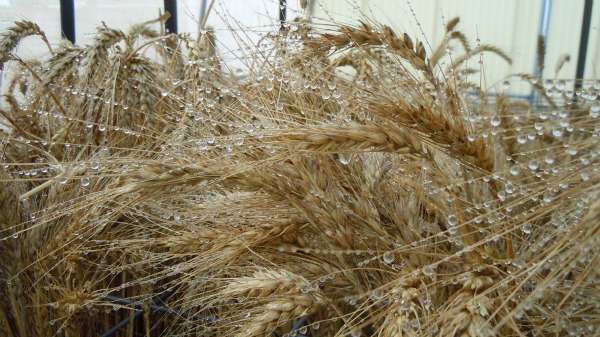Grain varieties chambered for sprouting susceptibility

With harvest about to move into full swing across WA's grainbelt, many farmers are nervously looking skyward, crossing their fingers and hoping the rain stays away.
For many growers though, particularly those on the south coast, rain during the harvest period is common, and can wipe millions of dollars from a crop if it causes sprouting in the grain.
Acknowledging this major obstacle to profitability, researchers will be simulating rain events in a specially designed chamber, hoping to understand the susceptibility of different wheat varieties to sprouting.
Department of Agriculture and Food WA research officer Jeremy Curry, based in Esperance, says germination tests in laboratories, while providing guidance, did not give growers enough accuracy needed to make variety decisions.
DAFWA's Wheat Variety Guide, released each year, contains sprouting ratings for commonly grown varieties based on the germination index established in the laboratory as well as previous sprouting trials in a prototype rain chamber.
"But laboratory results don't always correlate accurately into the field," Mr Curry says.
The rain chamber, built specifically for the purpose of simulating rain events, will be up and running in just a few weeks, ready for the 2015 harvest.
New varieties to be put through their paces in rain simulations
Mr Curry says numerous wheat varieties will be cut at 40cm below the head, and placed in the chamber to replicate a standing wheat crop.
The chamber will then simulate a heavy rain event of 30mm over two hours followed by light rain for four different time periods of 24, 36, 48 and 60 hours, plus a control of no rain, with the temperature and humidity controlled.
He says the most significant aspect of the testing is the inclusion of new varieties, such as Scepter, in the research.
Australian Grain Technologies has recently released Scepter as the replacement to Mace, which is currently the dominant variety grown across WA's grainbelt.
Scepter seed is already available for purchase and it is anticipated many growers will be considering it for the 2016 season.
"While the variety has been tested using the laboratory germination index, we believe farmers will be interested in seeing how it performs in field conditions during rain events," Mr Curry says.
Other new varieties to be tested in the rain chamber include Cutlass, which is the replacement variety for Yitpi, plus unreleased, unnamed varieties.
Mr Curry says sprouted grain is often downgraded to feed, shaving hundreds of dollars from each tonne delivered.
Provided by Science Network WA
This article first appeared on ScienceNetwork Western Australia a science news website based at Scitech.





















